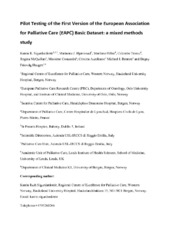| dc.contributor.author | Sigurdardottir, Katrin Rut | en_US |
| dc.contributor.author | Hjermstad, Marianne Jensen | en_US |
| dc.contributor.author | Filbet, Marilene | en_US |
| dc.contributor.author | Tricou, Colombe | en_US |
| dc.contributor.author | McQuillan, Regina | en_US |
| dc.contributor.author | Costantini, Massimo | en_US |
| dc.contributor.author | Autelitano, Cristina | en_US |
| dc.contributor.author | Bennett, Michael I. | en_US |
| dc.contributor.author | Haugen, Dagny Faksvåg | en_US |
| dc.date.accessioned | 2020-05-12T10:57:25Z | |
| dc.date.available | 2020-05-12T10:57:25Z | |
| dc.date.issued | 2019 | |
| dc.Published | Sigurdardottir KR, Hjermstad MJ, Filbet, Tricou, McQuillan, Costantini M, Autelitano, Bennett MI, Haugen DF. Pilot testing of the first version of the European Association for Palliative Care basic dataset: A mixed methods study. Palliative Medicine. 2019;33(7):832-849 | eng |
| dc.identifier.issn | 0269-2163 | |
| dc.identifier.issn | 1477-030X | |
| dc.identifier.uri | https://hdl.handle.net/1956/22196 | |
| dc.description.abstract | Background: Inadequate description of palliative care cancer patients in research studies often leads to results having limited generalizability. To standardize the description of the sample, the European Association for Palliative Care basic data set was developed, with 31 core demographic and disease-related variables. Aim: To pilot test the data set to check acceptability, comprehensibility and feasibility. Design: International, multi-centre pilot study at nine study sites in five European countries, using mixed methods. Setting/participants: Adult cancer patients and staff in palliative care units, hospices and home care. Results: In all, 191 patients (544 screened) and 190 health care personnel were included. Median time to fill in the patient form was 5 min and the health care personnel form was 7 min. Ethnicity was the most challenging item for patients and requires decisions at a national level about whether or how to include. Health care personnel found weight loss, principal diagnosis, additional diagnoses and stage of non-cancer diseases most difficult to respond to. Registration of diagnoses will be changed from International Statistical Classification of Diseases and Related Health Problems, 10th version code to a predefined list, while weight loss and stage of non-cancer diseases will be removed. The pilot study has led to rewording of items, improvement in response options and shortening of the data set to 29 items. Conclusion: Pilot testing of the first version of the European Association for Palliative Care basic data set confirmed that patients and health care personnel understand the questions in a consistent manner and can answer within an acceptable timeframe. The pilot testing has led to improvement, and the new version is now subject to further testing. Keywords Neoplasms, palliative care, patient outcome assessment, questionnaire design, standards, data set, pilot study | en_US |
| dc.language.iso | eng | eng |
| dc.publisher | Sage | eng |
| dc.title | Pilot testing of the first version of the European Association for Palliative Care basic dataset: A mixed methods study | en_US |
| dc.type | Peer reviewed | |
| dc.type | Journal article | |
| dc.date.updated | 2020-01-24T16:59:47Z | |
| dc.description.version | acceptedVersion | en_US |
| dc.rights.holder | Copyright 2019 The Author(s) | |
| dc.identifier.doi | https://doi.org/10.1177/0269216319844439 | |
| dc.identifier.cristin | 1709730 | |
| dc.source.journal | Palliative Medicine | |
